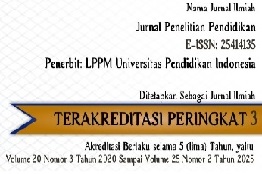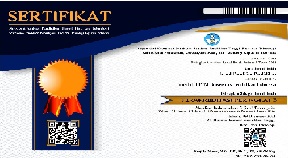Teachers’ Perception of Online Learning during Pandemic Covid-19
Abstract
Since March 2020, the case of coronavirus disease or known as Covid-19, has become a global pandemic. According to UNESCO, schools are closed in about 100 countries due to a public health emergency, including Indonesia. The condition forces teachers to make the transition of the way they teach from face to face learning to online learning. This study investigated EFL teachers’ Perception of online English language learning. Their perceptions were analyzed in three aspects: perceived usefulness, perceived ease of use, and their attitude toward online English language learning. This study employed a descriptive design with a qualitative approach. A survey questionnaire and interview were used in this study to elicit the responses of 102 Junior High School English teachers in Bandung. This study's findings revealed that the participants showed a positive perception of the usefulness and ease of use of online learning systems during pandemic Covid-19. Still, more than half of the teachers didn’t agree on the effectiveness of it. Even though the teachers face many online teaching problems, they could show the right attitude toward using technology to teach online.
Keywords
Full Text:
PDFReferences
Journal of Engineering Research and Modern Education (IJERME), Vol. 1(1), pp. 225-235, 2016 ISSN: 2455–4200, DOI/10.5281/zenodo.161113., Available at SSRN: https://ssrn.com/abstract=2977427
Almosa, A. (2002). Use of computer in education, (2nd ed). Riyadh: Future Education Library.
Anderson, T. (2008). The Theory and Practice of Online Learning. Second Edition. AU Press Canada. Athbasca University.
Bozkurt, A., Ozbek, E., Yilmazel, S., Erdogdu, E., Ucar, H., Guler, E., Sezgin, S., Karadeniz, A., Sen-Ersoy, N., Canbek, N., Dincer, G., Ari, S., & Hakan, C. (2020). A global outlook to the interruption of education due to COVID-19 Pandemic: Navigating in a time of uncertainty and crisis. Asian Journal of Distance Education, 15(1), p. 1-126. Retrieved from http://www.asianjde.org/ojs/index.php/AsianJDE/article/view/462
Carliner, S. (2004). Overview of online learning. Amherst, MA: Human Resource Development Press.
Chaney E. G. (2001). Web-based instruction in a Rural High School: A Collaborative Inquiry into Its Effectiveness and Desirability. NASSP Bulletin, 85(628), 20-35. Retrieved from https://doi.org/10.1177/019263650108562803
Davis, F. D., Bagozzi, R. P., & Warshaw, P. R. (1989). User acceptance of computer technology: A comparison of two theoretical models. Management Science, 35(8), 982-1003. Retrieved from https://doi.org/10.1287/mnsc.35.8.982
Fry, K. (2001). E-learning markets and providers: some issues and prospects. Education Training, 233-239. Retrieved from https://doi.org/10.1108/EUM0000000005484
Giovannella, C. (2020). Measuring the effect of the Covid-19 pandemic on the Italian Learning Ecosystems at the steady state: a school teachers’ perspective. Retrieved from https://www.researchgate.net/publication/343127257
Klapproth, F., Federkeil, L., Heinschke, F., & Jungmann, T. (2020). Teachers’ experiences of stress and their coping strategies during COVID-19 induced distance teaching. Journal of Pedagogical Research. Advanced online publication. doi: 10.33902/JPR.2020062805
Lestiyanawati, R. &, Widyantoro, A. (2020). Strategies and Problems Faced by Indonesian Teachers in Conducting ELearning System During COVID-19 Outbreak. CLLiENT Journal (Journal of Culture, Literature, Linguistics and English Teaching), 2(1). Retrieved from https://ojs.unsiq.ac.id/index.php/cllient/article/view/1271
Marc, J. R. (2007). Book review: e-learning strategies for delivering knowledge in the digital age. Internet and Higher Education, 5, 185-188. Retrieved from https://doi.org/10.1002/pfi.4140410512
Nambiar, D. (2020). The impact of online learning during COVID-19: students’ and teachers’ perspective. The International Journal of Indian Psychology, 8(2). DOI: 10.25215/0802.094. Retrieved from http://www.ijip.in
Orhan, G., & Beyhan, O. (2020). Teachers’ perceptions and teaching experiences on distance education through synchronous video conferencing during Covid-19 Pandemic. Social Sciences and Education Research Review, 7(1), pp 8–44. Retrieved from https://www.researchgate.net/profile/Sigridur_Olafsdottir2/publication/344025173
Ramírez, A. R. I, Sabaté, F., & Guevara, V. F. (2015). Evaluating student acceptance level of e-learning systems. A: International Conference of Education, Research and Innovation. ICERI2015: Proceedings 8th International Conference of Education, Research and Innovation. Retrieved from http://hdl.handle.net/2117/80996.
Ramij, Md. G., & Sultana, A. (2020). Preparedness of Online Classes in Developing Countries amid COVID-19 Outbreak: A Perspective from Bangladesh. Available at SSRN: https://ssrn.com/abstract=3638718 or http://dx.doi.org/10.2139/ssrn.3638718
Rasmitadila, A. R., Rachmadtullah, R., Samsudin, A., Syaodih, E., Nurtanto, M., & Tambunan, A. (2020). The perceptions of primary school teachers of. online learning during the COVID-19 pandemic period: A case study in Indonesia. Journal of Ethnic and Cultural Studies 2020, 7(2), 90-109. Retrieved from http://dx.doi.org/10.29333/ejecs/388.
Savenye, W. C. (2005). Improving Online Courses: What is Interaction and Why Use It? Retrieved from https://search.proquest.com/openview/07f39a4e3e24cbeecf16e984b126f847
Surat Edaran Nomor 4 tahun 2020. Pelaksanaan Kebijakan Pendidikan dalam Masa Darurat Penyebaran Corona Virus (Covid-10). Retrieved from https://jdih.kemdikbud.go.id/arsip/SE%20Menteri%20Nomor%204%20Tahun%202020%20 cap.pdf
Thomson, L. D. (2010). Beyond the classroom walls: Teachers’ and students’ perspectives on how online learning can meet the needs of gifted students. Journal of Advanced Academics, 21(4),662-712. Retrieved from http://joa.sagepub.com.pluma.sjfc.edu/content/21/4/662.full.pdf+html
UNESCO. (2020a). School closures caused by Coronavirus (Covid-19). Retrieved from https://en.unesco.org/covid19/educationresponse
Westberry, N. C., (2009). An activity theory analysis of social epistemologies within tertiary level e-Learning environments. University of Waikato, Hamilton, New Zealand. Retrieved from http://researchcommons.waikato.ac.nz/bitstream/10289/4184/3/thesis.pdf.
You, J. W., & Kang, M. (2014). The role of academic emotions in the relationship between perceived academic control and self-regulated learning in online learning. Computers & Education, 77, 125-133. Retrieved from https://doi.org/10.1016/j.compedu.2014.04.018.
DOI: https://doi.org/10.17509/jpp.v20i3.29226
Refbacks
- There are currently no refbacks.
Copyright (c) 2020 Jurnal Penelitian Pendidikan


